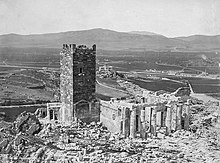12:23 AM
@Adam This is because it goes back to a two-termination Greek adjective ἄτομος. Greek adjectives that begin with the privative a- or an- only have 2nd declension forms. Besides atomos, the same is true for atheos (ἄθεος), anarchos (ἄναρχος), etc.
1:00 AM
1:11 AM
1:55 AM
@Cerberus I think you're right, too. Latin was fairly conservative for the several hundred years there was an active literary scene, but rapidly changed to the Romance languages once the western half of the empire fell.
2:10 AM
@cmw I would say the Greeks in Asia Minor probably never lost their literary tradition until perhaps fairly shortly before, or after, the formation of modern Greece? And around that time a larger proportion of the population could probably read, so it depends on how we define literacy: I'm sure they still wrote and read newspapers in Greek even when very few new novels came out.
I do know many places on the mainland were almost depopulated sometime before the formation of modern Greece, like Athens, while many Greeks remained in Asia minor.
Although "depopulated" is perhaps a strong word: around 5000 people still lived in Athens when modern Greece was established.

The Frankish Tower was a medieval tower built on the Acropolis of Athens by the Franks as part of the palace of the Dukes of Athens. It was demolished by the Greek authorities in 1874, on the initiative and with funding from Heinrich Schliemann.
== Location and appearance ==
The tower was situated on the western corner of the Acropolis, next to the Propylaea, but probably did not communicate directly with them, as paintings and photographs from the 19th century show the entrance above ground, on the tower's eastern face at the second-floor level, some 6 metres (20 ft) above the architrave of the...
Mainland Greece was a fairly thinly populated backwater for a long time, until after Greek independence from the Turks.
I think Rome went from a million people during the reign of Augustus to forty thousand some time after the Empire had fallen.
2 hours later…
4:40 AM
« first day (2155 days earlier) ← previous day next day → last day (851 days later) »
Transcript for
Jan17
Jan '2218
Jan19
 CONLOQVIVM
CONLOQVIVM
Ad linguam Latinam (etc.) disputandam | latin.stackexchange.com...
